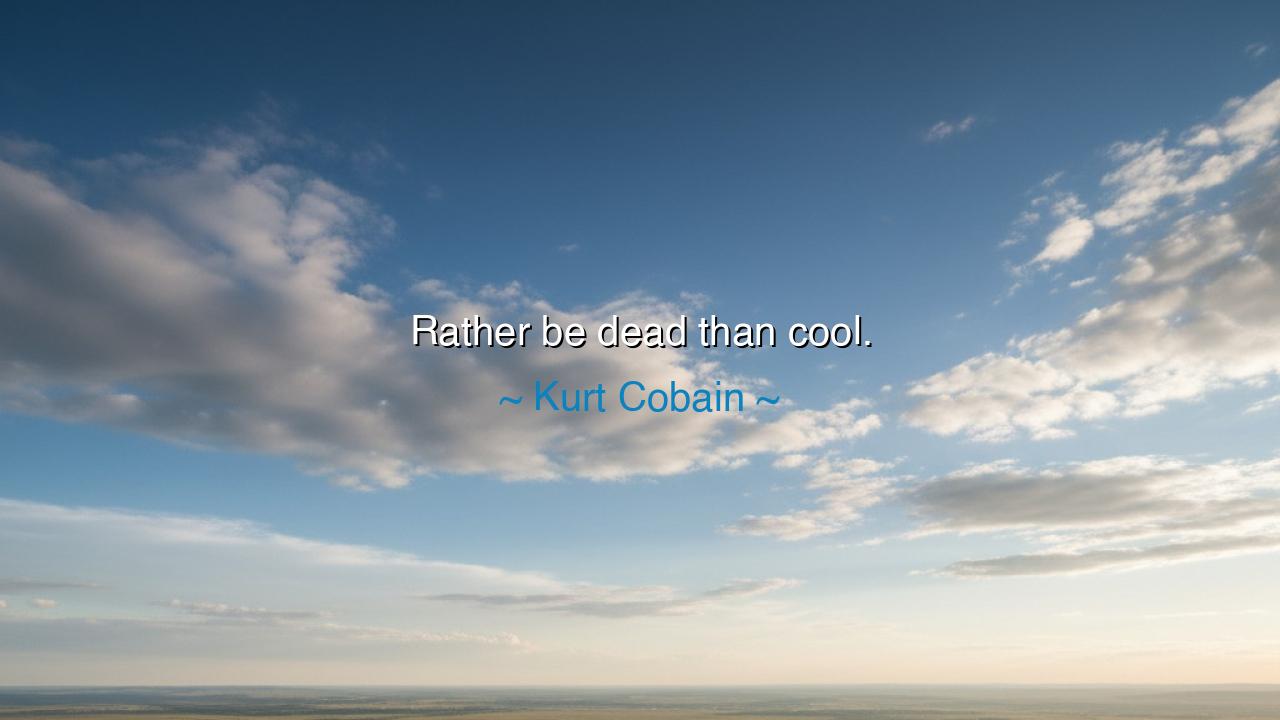
Rather be dead than cool.






In the bold and striking words of Kurt Cobain, "Rather be dead than cool," we hear a cry from the depths of a soul that refused to conform, to wear the mask of superficiality, and to bend to the demands of society. Cobain’s declaration speaks to the sacred value he placed on authenticity, a value so important to him that he would rather face death than live in the hollow pursuit of being "cool." But this is not just a rejection of the fleeting, shallow ideals of modern culture—it is a mournful acknowledgment of the price one must pay to remain true to oneself in a world that so often celebrates conformity over individuality. Cobain, the tortured artist, embodied this paradox: his coolness came not from trying to fit in, but from refusing to do so, even at the cost of his own peace.
This sentiment brings us to the ancient wisdom of Socrates, who believed that the unexamined life is not worth living. To Socrates, the pursuit of true virtue and wisdom was more important than adhering to the external pressures of society. In much the same way, Cobain rejected the hollow pursuit of external validation—the praise of the crowds, the admiration of superficial fame—because he believed that true life could only be found in authenticity. The pursuit of coolness, like the pursuit of fame, was merely a distraction from the deeper truths of existence. Socrates chose to die rather than compromise his principles, just as Cobain, in his own tragic way, made a similar choice.
To understand Cobain's words, one need only look at the life of Jesus of Nazareth, who rejected the worldly definitions of success in favor of a life of simplicity and service. Jesus, born into humble circumstances, did not seek the approval of kings, nor did he seek to be admired by the powerful. His path was not one of earthly glory, but of profound inner peace and commitment to his moral truths. He was not "cool" by the standards of his time, but his life, and his eventual death, were a testament to the power of living truthfully, regardless of the world’s opinion. His sacrifice on the cross was, in many ways, a declaration that being true to one’s purpose—no matter the cost—was worth more than any fleeting worldly achievement or status.
Cobain’s words also resonate with the teachings of Epictetus, the Stoic philosopher, who emphasized the importance of inner freedom over external approval. Epictetus would say, "Freedom is the only true happiness. The rest are just shadows." The Stoics believed that virtue and wisdom could not be compromised for the sake of fitting into society’s standards. They understood that coolness, or societal approval, was a fleeting illusion—something that could be taken away in an instant, leaving only emptiness. Cobain’s choice to reject the pursuit of coolness was a form of spiritual freedom, one that allowed him to live in alignment with his true self, even if it meant rejecting the superficiality that the world tried to impose upon him.
We can look to the life of Vincent van Gogh, whose struggle with mental illness and rejection from the artistic community ultimately led to his untimely death, to understand the profound depths of Cobain's statement. Van Gogh’s paintings, though underappreciated in his lifetime, have become some of the most beloved in history. In his work, van Gogh chose not to conform to the expectations of what was considered "successful" in art. His refusal to be "cool" in the eyes of the world was not a rejection of art, but a deeper commitment to creating in his own image—his truth. Both he and Cobain demonstrated that to follow the true call of one's inner self, rather than the fleeting praise of the world, often leads to great personal suffering, but it is a suffering that bears fruit in the end.
Therein lies the core of Cobain’s message: authenticity over acceptance, truth over illusion, and self-expression over the hollow pursuit of social standing. Coolness, as society defines it, is an ever-changing, unreliable measure of worth. It is shaped by trends, by what is popular in the moment, and by what others deem admirable. To seek it is to chase a phantom, a mirage that will only leave you empty and unsatisfied. Cobain, through his rebellion, his rawness, and his art, showed us that the true path to fulfillment lies in the courage to be yourself, to embrace your flaws and imperfections, and to create from a place of honesty.
The lesson we must take from Cobain’s painful yet profound words is that we must choose our own paths—paths that align with our truths, even when the world pushes us toward easier, more conventional routes. Do not seek approval from those who would define you by their standards of "cool." Instead, seek self-realization, and embrace your journey, no matter how difficult or misunderstood it may seem. Live authentically, and trust that the path of integrity, while often lonely, is the one that will bring the deepest peace and fulfillment. Like Cobain, van Gogh, or Socrates, let us remember that true greatness lies not in external praise, but in living a life that is true to our own soul.






AAdministratorAdministrator
Welcome, honored guests. Please leave a comment, we will respond soon